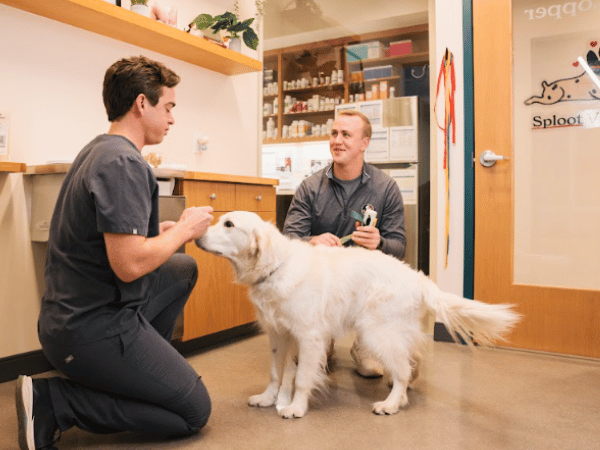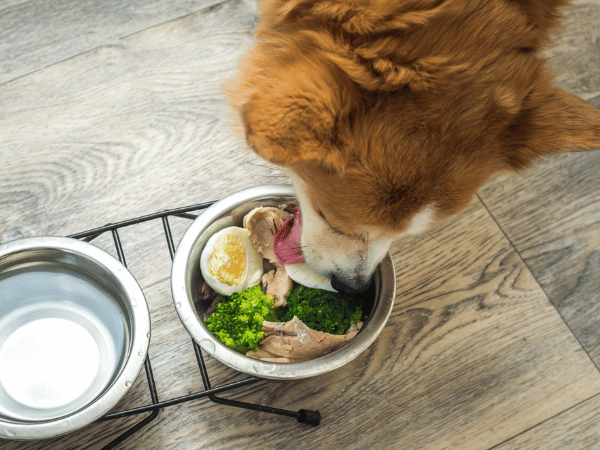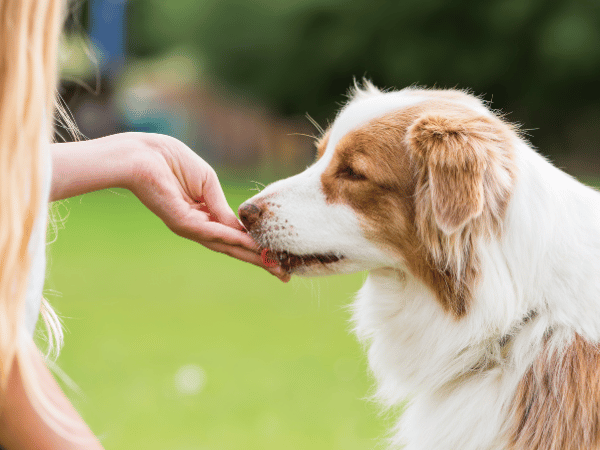Dogs are notorious for their curiosity about our food, whether it’s a delicious dinner or a sweet snack. As pet parents, we often feel inclined to share our meals with our furry friends. However, it’s important to note that not all human foods are safe for dogs. Understanding the difference between toxic and safe foods for dogs is crucial for their health and well-being.
What’s in This Guide?
This vet-approved guide aims to answer the commonly asked question, “Can my dog eat…?” It provides valuable insights into safe and toxic foods for dogs, ensuring that pet parents can make informed decisions when it comes to sharing food with their canine companions.
Table of Contents:
- Reminders About The Following Food Items
- Safety Note: What to Do in Case of Poisoning or Toxin Ingestion in Dogs
- I. Fruits and Veggies: Safe & Toxic Food For Dogs
- II. Animal Products: Toxic & Safe Food for Dogs
- III. Other Food Items: Safe vs. Toxic Food for Dogs

Reminders About The Following Food Items
Before we delve into the list of safe and toxic foods for dogs, it’s essential to keep the following reminders in mind:
1. The Safe Food for Dogs on This List Are Meant Only as Treats
All of the dog-friendly food items mentioned in this guide are suitable as treats and should not make up more than 10 percent of a dog’s daily intake. It’s crucial to provide high-quality AAFCO-approved dog food as their main source of nutrition.
Note: To ensure the quality of your dog’s food, you can check the brand using the evaluation tool from Pet Nutrition Alliance. If you’re considering homemade pet food, take a look at our article: Is Homemade Dog Food & Cat Food Better?
2. Always Check Before You Share
Dogs have different nutritional needs and sensitivities compared to humans. While some human foods are healthy for dogs, others can be safe in moderation or even toxic. Before sharing any food item with your dog, it’s essential to check its safety.
3. In Case of Gastrointestinal Upset or Suspected Poisoning
Certain foods labeled as harmful or not safe in this guide may cause gastrointestinal issues in dogs. If your dog experiences severe diarrhea or vomiting that persists for more than 12 hours, it warrants urgent medical attention from an emergency vet or urgent care veterinarian.
Note: If you suspect toxin ingestion or poisoning in your dog, we encourage you to call pet poisoning helplines such as Pet Poison Helpline or ASPCA Animal Poison Control Center for assistance over the phone. If wait times are too long, reach out to an urgent care veterinarian or emergency vet for prompt guidance.

I. Fruits and Veggies: Safe & Toxic Food For Dogs
Many fruits and vegetables can serve as excellent snacks for your dog, as they are packed with vitamins, minerals, fiber, and antioxidants. However, it’s crucial to note that not all fruits and vegetables are safe for dogs. Some can be toxic and pose significant health threats. Let’s explore some examples:
Can my dog eat bananas?
Dogs can enjoy bananas in moderation. They are a healthy snack, rich in potassium, vitamins, biotin, and fiber. However, since bananas are high in sugar, it’s best to offer them as treats in moderation.
Can my dog eat watermelons?
Watermelons are safe and beneficial for dogs, especially during the summer as they help keep them hydrated. Watermelons are high in potassium, Vitamin C, A, B6, and fiber. Remember to remove all seeds and avoid feeding your dog the watermelon rind, as they can cause intestinal blockage and gastrointestinal distress.
Can my dog eat apples?
Apples are safe for dogs and provide vitamins C & A, potassium, antioxidants, and fiber. They are also great for digestion and maintaining dental health. However, make sure to remove the apple seeds and core as they can be toxic and pose a choking hazard.
Can my dog eat oranges?
Dogs can enjoy the occasional treat of oranges, which are rich in vitamin C and fiber. However, the high acidity might not agree with all dogs’ stomachs, so it’s important to monitor for any signs of digestive discomfort. Remove any seeds and offer small, bite-sized pieces to your dog. Due to the sugar content, give oranges as treats occasionally.
Can my dog eat kiwi?
Kiwi is a safe and nutritious treat for dogs when given in moderation. Packed with vitamin C and fiber, kiwi can be beneficial to your dog’s health. Remember to peel the fruit to remove the furry outer layer, which can be challenging to digest for dogs. Cut the kiwi into small, manageable pieces to prevent choking and introduce it gradually to ensure your dog tolerates it well.
Can my dog eat berries?
Certain berries like blueberries, blackberries, strawberries, and raspberries are safe for dogs when given in moderation. Berries are excellent sources of antioxidants, vitamins, and minerals. Remember that berries are packed with nutrients, so even a small amount is beneficial for dogs. Avoid excessive feeding, and ensure they get less than the recommended amounts based on their size and breed.
Can my dog eat dried fruits?
No, we do NOT recommend giving dried fruits to dogs. Dried fruits are packed with concentrated sugar, which is not suitable for pups. Depending on the fruit and other additives, dried fruits can be toxic for dogs.
Can my dog eat eggplant?
Eggplant is safe for dogs when prepared properly. It offers plenty of fiber and essential nutrients beneficial for pups. Ensure the eggplant is cooked, unseasoned, and sliced. Remove the stem and leaves as they can be toxic to dogs.
Can my dog eat carrots?
Carrots are a safe food for dogs. Whether served raw or cooked, carrots are low in calories and high in essential vitamins, minerals, and fiber. They also contribute to dental health. Cut carrots into bite-sized pieces to prevent choking.
Can my dog eat beans?
Certain beans like black beans, kidney beans, or green beans are safe and nutritious for dogs. When giving beans as treats or food toppers, ensure they are thoroughly cooked and free of any added seasonings, salt, or spices. Introduce beans gradually and in moderation to avoid digestive upset.
Can my dog eat Brussels sprouts?
Brussels sprouts are generally safe for dogs in moderation. They are packed with vitamins, fiber, and antioxidants. Cook Brussels sprouts without any seasonings and cut them into small, bite-sized pieces to prevent choking.
Can my dog eat onions or garlic?
Onions and garlic contain compounds that are toxic to dogs. They can damage red blood cells and reduce their ability to carry oxygen. Keep your dog away from onions, garlic, and their powders.

II. Animal Products: Toxic & Safe Food for Dogs
Just like fruits and veggies, some animal products can be a great addition to your dog’s diet, while others should be given with caution. It’s important to consider possible food allergies in dogs, especially when it comes to proteins like chicken and beef.
Can my dog eat eggs?
Yes, dogs can eat eggs, which are highly beneficial for upset stomachs. Eggs are easily digestible, rich in protein, and contain essential fatty acids. Cook eggs before feeding them to dogs to reduce the risk of salmonella.
Can my dog eat chicken?
Cooked, unseasoned chicken is safe and provides a great source of digestible protein for dogs. Avoid giving them raw chicken due to the risk of salmonella. Remove all bones to prevent choking or digestive issues.
Can my dog eat pork?
Pork is safe for dogs to eat as long as it’s unseasoned and without added spices or sauces. Processed pork products like ham or bacon should never be fed to dogs as they are high in salt and can be harmful.
Can my dog eat beef?
Lean beef is safe for dogs and offers an excellent source of protein. Most dogs enjoy the taste of beef. Serve cooked and unseasoned beef as treats or food toppers.
Can my dog eat fish?
Fish is safe for dogs when prepared properly. It provides protein, omega-3 fatty acids, and essential nutrients. Opt for low-mercury fish like salmon or trout and remove all bones to prevent choking or intestinal issues. Introduce fish gradually to monitor for sensitivities.
Can my dog eat butter?
While small amounts of butter are generally not toxic to dogs, it’s advisable to strictly limit their consumption due to its high-fat content. Some dogs may be lactose intolerant, so butter can cause gastrointestinal issues.
Can my dog eat cheese?
Although cheese and other dairy products are not toxic, we do not recommend feeding large amounts to dogs. Many dogs are lactose intolerant, and consuming dairy can lead to gastrointestinal upset. Monitor your dog closely for any adverse effects.

III. Other Food Items: Safe vs. Toxic Food for Dogs
Apart from fruits, veggies, and meat, pet parents may wonder if it’s safe to share certain processed foods with their dogs. Here’s what you should know:
Can my dog eat peanut butter?
Some brands of peanut butter are safe for dogs in moderation. However, it’s crucial to avoid peanut butter that contains xylitol, an artificial sweetener that is highly toxic to dogs. Choose peanut butter with peanuts as the only ingredient.
Can my dog eat chocolate?
No, chocolate is toxic to dogs. It contains theobromine and caffeine, which dogs cannot metabolize properly. Even small amounts of chocolate can make dogs sick and may lead to severe health issues.
Can my dog eat honey?
Dogs can eat honey in moderation, as it offers potential health benefits such as natural antioxidants and antibacterial properties. Opt for natural, unprocessed honey to avoid products containing xylitol, which is toxic to dogs.
Can my dog eat popcorn?
Plain, air-popped popcorn is generally safe for dogs in moderation. It provides a low-calorie and fiber-rich snack. Avoid adding butter, salt, or any flavorings, as they can be harmful. Be cautious of unpopped kernels that pose a choking hazard.
Can my dog eat junk food?
It’s not recommended to feed your dog junk food such as chips, candy, or processed snacks meant for human consumption. These foods contain high levels of salt, sugar, unhealthy fats, and artificial additives, which can lead to various health issues, including obesity and digestive problems.
Can my dog have coffee or tea?
Food or drinks containing coffee, tea, or caffeine are toxic to dogs. Caffeine stimulates their nervous system and can cause hyperactivity, vomiting, diarrhea, elevated heart rate, and seizures. Keep your dog away from any caffeine-containing products.
Can my dog eat nutmeg in baked goods?
Nutmeg is not safe for dogs. It contains myristicin, which can cause various health issues such as disorientation, increased heart rate, high blood pressure, and stomach pain. Ensure that baked goods containing nutmeg are kept securely away from dogs.

Final Thoughts on Safe vs Toxic Foods for Dogs
This wraps up our vet-approved guide on safe and toxic foods for dogs. For more vet-approved nutritional guides, feel free to check out the following:
- Top 10 Healthiest Human Foods That Dogs Can Eat
- Is Homemade Dog Food & Cat Food Better?
- The Safest & Healthiest Fruits Dogs Can Eat
- Expert Tips on Feeding a Picky Eater Dog or Cat
If you have further pet nutrition questions or urgent care concerns, we’re here to help. Sploot Veterinary Care is a trusted primary and urgent care vet clinic with multiple conveniently located vet clinics in Denver and Chicago. We offer daily appointment availability, 365 days a year, until 10 pm. We also provide urgent-intake appointments.
Secure an appointment easily online or through the Sploot Vets app. As always, we’re with you every step of the way.
